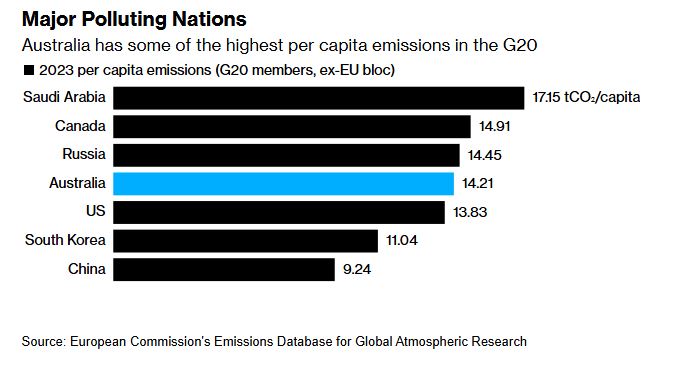
Article by David Stringer, courtesy of Bloomberg
20.08.2025
Mining tycoon Gina Rinehart, Australia’s richest person, has urged the country to ditch its pursuit of net zero emissions, insisting the costs of climate action will devastate sectors from healthcare to logistics and defense.
The billionaire, who has frequently criticized climate science and green policies, adds to a strengthening global pushback against efforts to slash greenhouse gas pollution, a movement that’s been emboldened by President Donald Trump’s moves to curb activity in the US.
“There’s nothing wrong with individuals choosing to spend their own money to aim for net zero, but why should executives use shareholders’ money and governments use taxpayers’ money unproductively,” Rinehart wrote in an op-ed column published Wednesday in publications including the Herald Sun newspaper.
More consideration is required of the “many, many, many Australians that net zero requirements by our governments will hurt,” she wrote. “The cost Australia simply cannot bear. It’s time for truth.”
Rinehart is a vocal supporter of Trump, and this year boosted her holdings in his social media platform Truth Social.
Australia, one of the world’s largest per-capita emitters, is targeting net zero by 2050 and in 2022 set legally-binding targets to reduce carbon dioxide emissions by 43% below 2005 levels by the end of this decade.

Prime Minister Anthony Albanese’s center-left government, which retained office in a resounding May election win, is finalizing proposals for additional cuts to pollution through 2035, and also seeking to jointly host next year’s flagship United Nations climate summit with Pacific nations.
Climate Change and Energy Minister Chris Bowen’s office didn’t immediately respond to a request for comment.
“Net zero can mean much lower energy bills for households and industry,” said Amandine Denis-Ryan, Chief Executive for Australia at the Institute for Energy Economics and Financial Analysis, a think tank that advocates for a faster green transition.
Rinehart, whose business interests span iron ore and coal mining to agriculture, criticized climate policies as likely to add burdensome costs through requirements for emissions-free vehicles and haul trucks, and argued that decarbonization policies could impact the ability of emergency services, the military and hospitals to operate effectively.
“This leads to the deindustrialization of our country, meaning job losses, stress and no doubt having to raise taxes to be able to pay for extra welfare payments,” Rinehart wrote.
Rival miners including BHP Group and Rio Tinto Group, the industry’s two largest companies, are advancing adoption and testing of electric trucks and equipment, including in Australia.
Lawmakers in the UK and Australia have questioned the value of emissions targets in recent months, while Wall Street banks and other global lenders have exited the sector’s main climate action coalition.
“Net zero by 2050 is impossible,” the UK’s Conservative Party leader Kemi Badenoch said in March. “Anyone who has done any serious analysis knows it can’t be achieved without a significant drop in our living standards or worse, by bankrupting us.”



